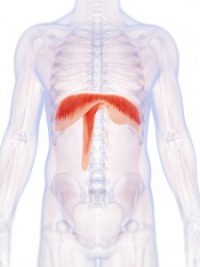The Herald Bulletin by Abbey Doyle
Anderson, Indiana, November 7, 2011

A serious car crash 22 years ago took away Arlyne Wells’ ability to walk, pick up a telephone and even breathe.
The crash left Wells as a quadriplegic, a prisoner to her ventilator. The device made talking impossible without the use of a separate machine. It made leaving her bed extremely difficult and life in general much more challenging.
But after much convincing by her doctor — Indianapolis neurosurgeon Dr. Michael Turner — Wells was given back much of what the crash took away from her in the form of a diaphragm pacing system.
“I have more freedom,” Wells said from her Anderson home. “I’m more mobile. I don’t have to be so worried.”
She had depended previously on a ventilator which forced air into her lungs. Wells didn’t do anything to breathe, something that was terrifying at first. With the diaphragm pacing system she breathes on her own with the aid of the device.
“It is like breathing was before the accident,” Wells said, shrugging her shoulders with each breath to help project her voice. “My black box is how I refer to it. And it is a nine-volt battery that is keeping me alive, that and the good Lord above.”
Turner said Wells was a great candidate for the device. She’s had it for several years and the improvement to her quality of life is significant.
“Once she was able to get the device she was much more independent and it made her life overall much better,” he said. “Now, all she carries around is a box.”
Wells said she would encourage anyone who thinks they might be a candidate for the device to definitely consider it. Her only regret is waiting so long to get it.
Wells’ life is a full one. She hasn’t let her paralysis stop her from living. She even sings with the women’s choir at Madison Park Church of God and has been on a cruise.
In addition to the improvements to her quality of life, the device reduces hospitalizations and other issues sometimes caused by a ventilator.
Registered nurse Helen Wright, one of Wells’ five caregivers, said this device is much easier as it doesn’t require stringent cleaning and maintenance and is easier to ensure it is working properly.
Further information about Dr. Turner’s practice can be found at the Goodman Campbell Brain and Spine website. The article can be viewed in its entirety by clicking here.

